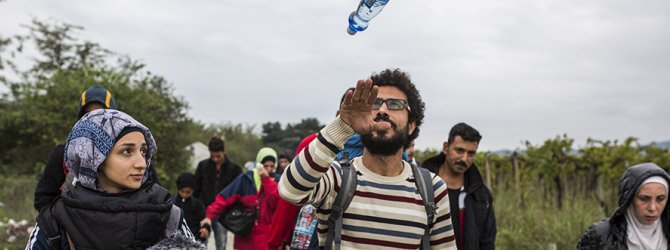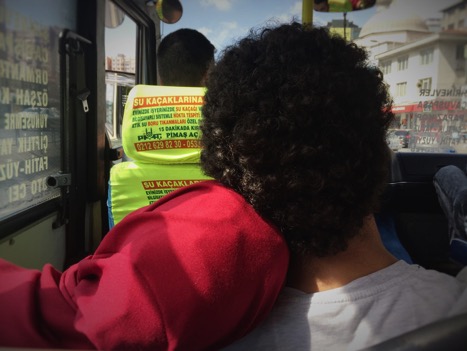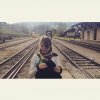-
On The Refugee Route Part I: Choosing The Hard Way Out Of ...
On The Refugee Route Part I: Choosing The Hard Way Out Of The WANA Region

Somar Kreker is a movie junkie. He loves cinema for the fact that it's a space that allows people to reimagine the worlds in which they live. As a teenager, he dreamt of opening a film club in Damascus, where stories of ordinary and extraordinary lives would be brought to the big screen. But of all the possible impediments interrupting his vision, an Arab Spring erupting in the West Asia North Africa region, and in Syria specifically, was the last thing he expected.
Without warning, Somar found himself witnessing his fellow countrymen and women redrawing their lives, not on scripts, but directly in front of him, in the streets of Al Zabadani, Al Hameh and Qudsaya. The son of proud pan-Arab nationalist, raised on tales of revolutionary Arab leaders like Gamal Abdul Nasser, Somar joined the ranks of peaceful demonstrators, learning — city by city — to see his country in a different light.
In the spring of 2012, Somar fell into the hands of the Syrian Intelligence, commonly known as the Mukhabarat. He was 24 years old. During his detention, he and his young cellmates would exchange visions and aspirations of a possible post-Assad Syria, alternating sleeping turns and using Somar's torn and stained jacket to fan one another in the stifling heat. In that harsh isolation he slowly began to understand the new era his country was entering.
When Somar was released, one month later, he came face-to-face with what this new era really meant. Civilians had taken up arms and his country was teetering on the verge of full-blown war. Like the many other young Syrians around him, he saw two options: to fight or to flee. Unable to imagine fighting his fellow countrymen, Somar sought refuge in Jordan: “We [the people] are not strong enough to fight (Assad),” he said.
The next three years drew Somar even further away from his dream project. Without a work permit, he resorted to informal jobs working long hours at cafes and restaurants. His ‘employability’ was not rooted in his colorful imagery or ability to capture ordinary beauty in everyday lives; it was instead soley determined by his status as an illegal worker. Without a work permit, Syrians could be relied on to work hard for well below the minimum wage. Somar was aware of the tightrope he was walking. Against the increasingly anti-refugee rhetoric emerging in Jordanian society, those caught working illegally were vulnerable to deportation. Somar’s situation was indistinguishable from tens of thousands of Syrians and other asylum seeking populations living in urban Jordan, Turkey, Iraq and Lebanon.
In August 2015, three quiet years of clandestine existence were finally broken. The passport renewal that he had been waiting on for months finally came through. He and his younger sisters, Salsabil (20) and Lubna (15), who were both still with Somar's parents in Syria, forged a plan. They would fly from Damascus to Istanbul, where Somar would meet them. Together, they would find a way into Europe and reunite with their older brother in Germany.

Somar and his younger sister Lubna in a bus traveling to see a family friend in Istanbul, 13/9/2015
Over a cup of Turkish coffee in Jabal el Weibdeh, I met with Somar and tried to dissect whether he was aware of the horror stories emerging in the media about the dangers people faced crossing the Mediterranean. I had fallen into the trap of taking the higher moral standing against what I perceived to be the evil act of smuggling, finding it unfathomable that Somar was about to place himself and his sisters at such risk when there were still official channels to be exhausted.
Somar was enough of a pragmatist to realise that he wasn’t going to be resettled. Unattached, young Muslim men hardly stood out as vulnerable; quite the contrary, he epitomized the stereotype of a far more insidious demographic. And he knew that western countries were not calling out for budding filmmakers; they wanted unaccompanied women, religious minorities and blue-collar workers. As he explained this, I recalled the countless Syrians I knew who had purchased a dedicated cell phone that they kept fully charged waiting for that resettlement call from the UN Refugee Agency (UNHCR). Their optimism now seemed fanciful against Somar’s constructive pragmatism. Moreover, his family came from Jamraya, a village that had been under siege twice by July 2015. To my endless worst-case scenarios that might obstruct his journey to Europe, his retort was simple: “I don’t know the situation inside Syria as well as my father does, so I trust his judgement.” For Somar, the risks along the smuggling path outweighed the scenarios that could befall his sisters in Syria.
I realised that despite my readings and interest in the Syrian conflict, I had none of the tools needed to understand Somar’s cost-benefit analysis. The dislocation, isolation and uncertainty that accompany war and displacement are things that can only be experienced. But more than anything, I realised that Somar yearned for something not present in either Jordan or Syria: he wanted the hope of a future. This ambitious young man needed a landscape upon which to paint his dreams. So as I watched news footage of boats arriving at Greek shores, wondering how much was being manipulated and how little of the actual stories were being told, I made the decision to follow Somar to Turkey. Surely, I thought, there must be more to why young Syrian men were choosing the hard way out of the region.
Banner photo credit: Alessio Mamo
Dina Baslan is a Jordanian researcher and former aid worker. In September 2015, she accompanied her Syrian friend Somar Kreker to Europe, hiding among the refugees to nuance her understanding of the migration phenomenon first hand. This is the first in a series of articles documenting her journey, created in collaboration with the Institute's Head of Communications, Roisin Taylor.
Route taken by Somar Kreker from his hometown of Qudssaya, near Damascus, to the Jordanian Border.
.png)

